International Financial Management in Unilever: A Detailed Analysis
VerifiedAdded on 2023/06/08
|8
|1962
|91
Report
AI Summary
This report provides an analysis of international financial management within Unilever, a British multinational consumer goods organization. It discusses the significance of international financial management in Unilever, including its advantages in navigating global business environments, managing currency exchange, and attracting foreign direct investment. The report also addresses challenges faced by Unilever in the international market, such as maintaining prices and margins, disruption by direct-to-customer models, navigating crowded categories, and competition for marketing talent. Furthermore, it examines Unilever's dividend distribution policy, the Efficient Market Hypothesis in relation to Unilever, and methods of appraising projects, including economic, financial, and market analysis. The report concludes that international financial management is crucial for Unilever's success in global markets, despite facing various competitive challenges.
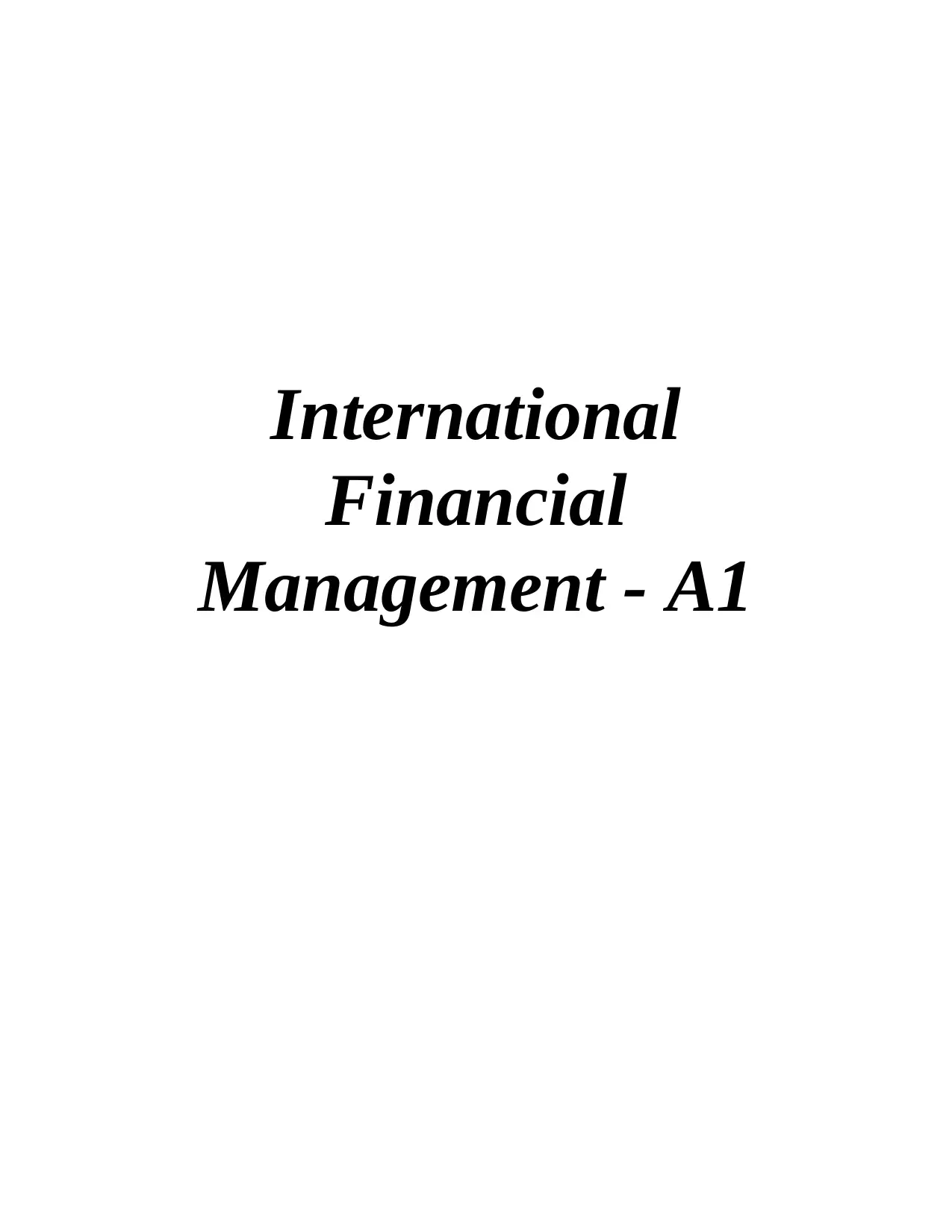
International
Financial
Management - A1
Financial
Management - A1
Paraphrase This Document
Need a fresh take? Get an instant paraphrase of this document with our AI Paraphraser
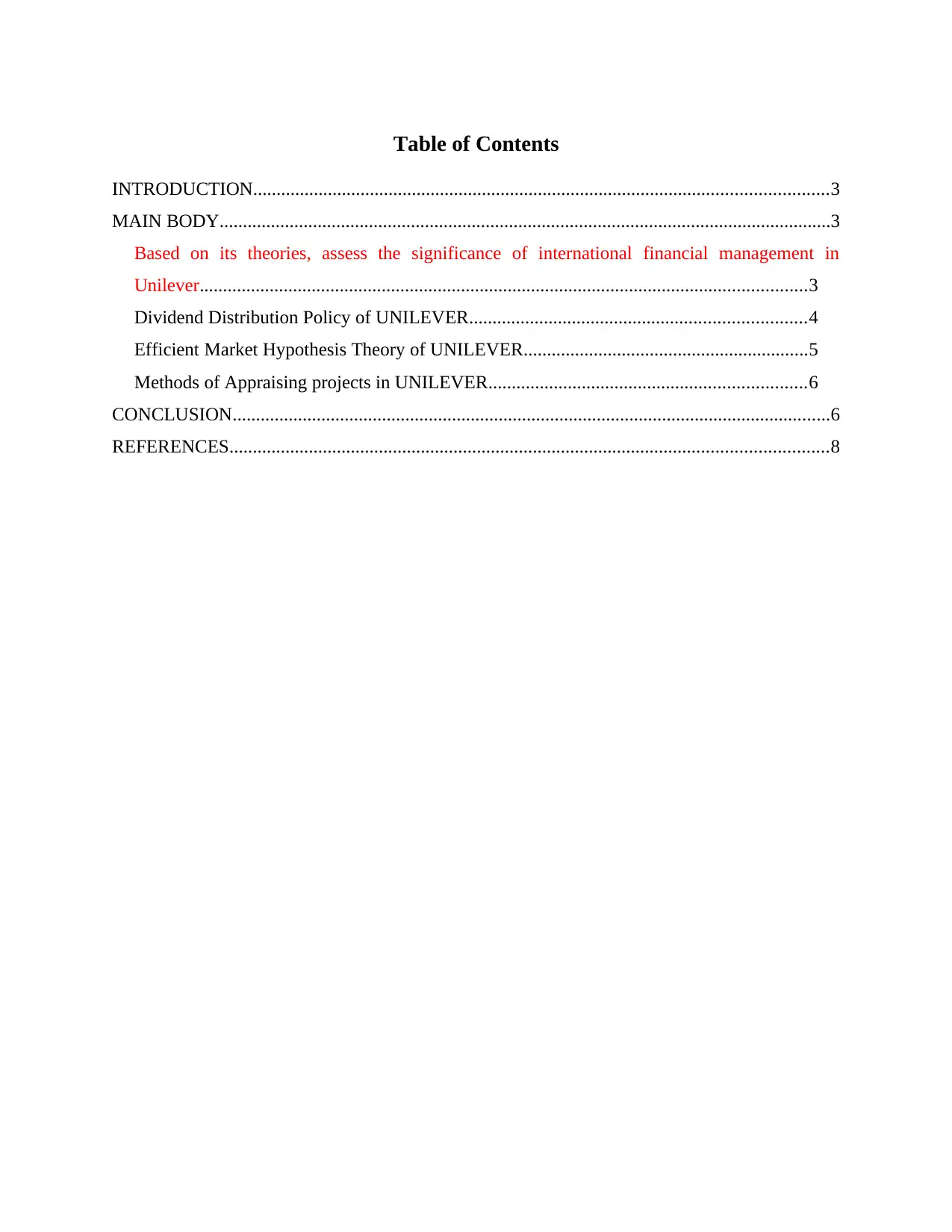
Table of Contents
INTRODUCTION...........................................................................................................................3
MAIN BODY...................................................................................................................................3
Based on its theories, assess the significance of international financial management in
Unilever..................................................................................................................................3
Dividend Distribution Policy of UNILEVER........................................................................4
Efficient Market Hypothesis Theory of UNILEVER.............................................................5
Methods of Appraising projects in UNILEVER....................................................................6
CONCLUSION................................................................................................................................6
REFERENCES................................................................................................................................8
INTRODUCTION...........................................................................................................................3
MAIN BODY...................................................................................................................................3
Based on its theories, assess the significance of international financial management in
Unilever..................................................................................................................................3
Dividend Distribution Policy of UNILEVER........................................................................4
Efficient Market Hypothesis Theory of UNILEVER.............................................................5
Methods of Appraising projects in UNILEVER....................................................................6
CONCLUSION................................................................................................................................6
REFERENCES................................................................................................................................8
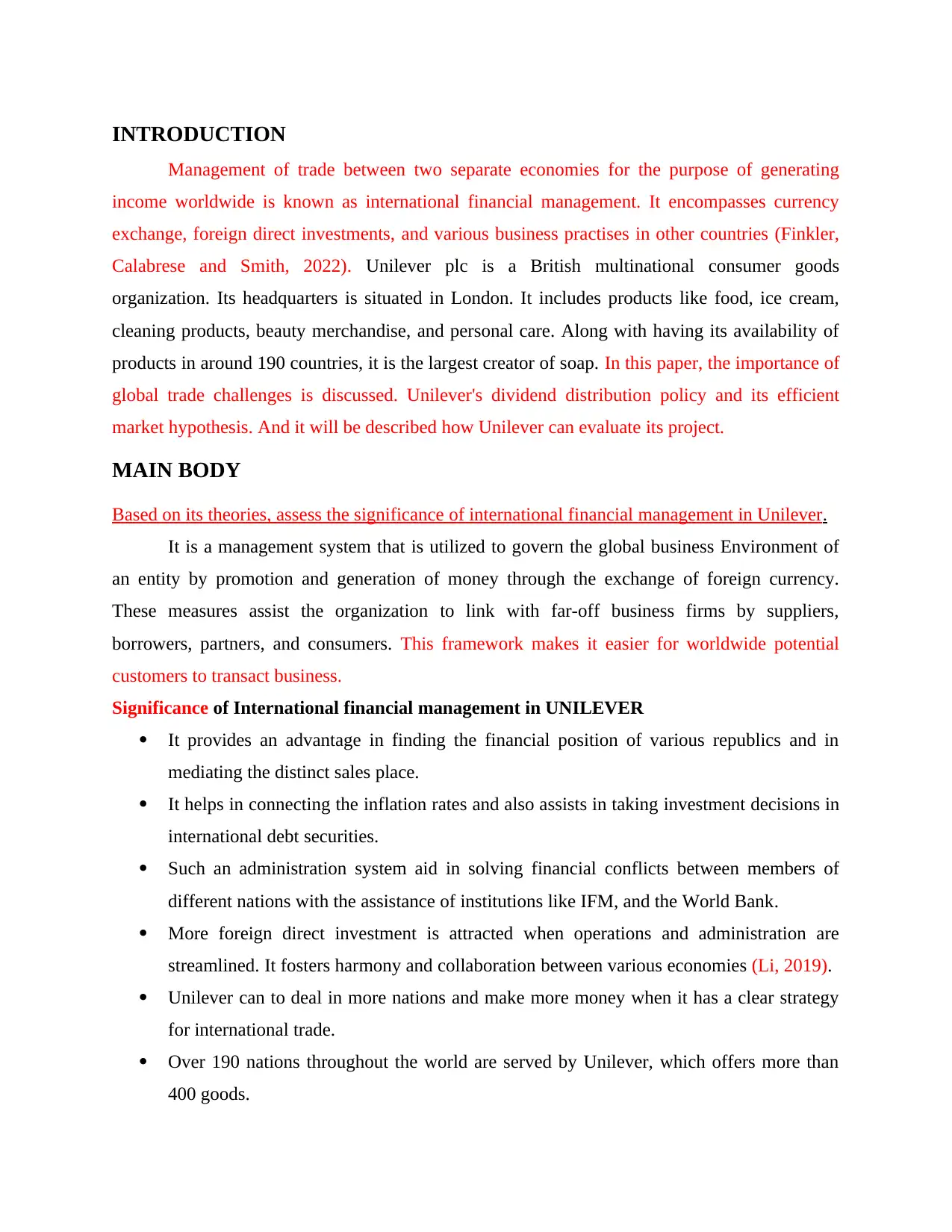
INTRODUCTION
Management of trade between two separate economies for the purpose of generating
income worldwide is known as international financial management. It encompasses currency
exchange, foreign direct investments, and various business practises in other countries (Finkler,
Calabrese and Smith, 2022). Unilever plc is a British multinational consumer goods
organization. Its headquarters is situated in London. It includes products like food, ice cream,
cleaning products, beauty merchandise, and personal care. Along with having its availability of
products in around 190 countries, it is the largest creator of soap. In this paper, the importance of
global trade challenges is discussed. Unilever's dividend distribution policy and its efficient
market hypothesis. And it will be described how Unilever can evaluate its project.
MAIN BODY
Based on its theories, assess the significance of international financial management in Unilever.
It is a management system that is utilized to govern the global business Environment of
an entity by promotion and generation of money through the exchange of foreign currency.
These measures assist the organization to link with far-off business firms by suppliers,
borrowers, partners, and consumers. This framework makes it easier for worldwide potential
customers to transact business.
Significance of International financial management in UNILEVER
It provides an advantage in finding the financial position of various republics and in
mediating the distinct sales place.
It helps in connecting the inflation rates and also assists in taking investment decisions in
international debt securities.
Such an administration system aid in solving financial conflicts between members of
different nations with the assistance of institutions like IFM, and the World Bank.
More foreign direct investment is attracted when operations and administration are
streamlined. It fosters harmony and collaboration between various economies (Li, 2019).
Unilever can to deal in more nations and make more money when it has a clear strategy
for international trade.
Over 190 nations throughout the world are served by Unilever, which offers more than
400 goods.
Management of trade between two separate economies for the purpose of generating
income worldwide is known as international financial management. It encompasses currency
exchange, foreign direct investments, and various business practises in other countries (Finkler,
Calabrese and Smith, 2022). Unilever plc is a British multinational consumer goods
organization. Its headquarters is situated in London. It includes products like food, ice cream,
cleaning products, beauty merchandise, and personal care. Along with having its availability of
products in around 190 countries, it is the largest creator of soap. In this paper, the importance of
global trade challenges is discussed. Unilever's dividend distribution policy and its efficient
market hypothesis. And it will be described how Unilever can evaluate its project.
MAIN BODY
Based on its theories, assess the significance of international financial management in Unilever.
It is a management system that is utilized to govern the global business Environment of
an entity by promotion and generation of money through the exchange of foreign currency.
These measures assist the organization to link with far-off business firms by suppliers,
borrowers, partners, and consumers. This framework makes it easier for worldwide potential
customers to transact business.
Significance of International financial management in UNILEVER
It provides an advantage in finding the financial position of various republics and in
mediating the distinct sales place.
It helps in connecting the inflation rates and also assists in taking investment decisions in
international debt securities.
Such an administration system aid in solving financial conflicts between members of
different nations with the assistance of institutions like IFM, and the World Bank.
More foreign direct investment is attracted when operations and administration are
streamlined. It fosters harmony and collaboration between various economies (Li, 2019).
Unilever can to deal in more nations and make more money when it has a clear strategy
for international trade.
Over 190 nations throughout the world are served by Unilever, which offers more than
400 goods.
⊘ This is a preview!⊘
Do you want full access?
Subscribe today to unlock all pages.

Trusted by 1+ million students worldwide
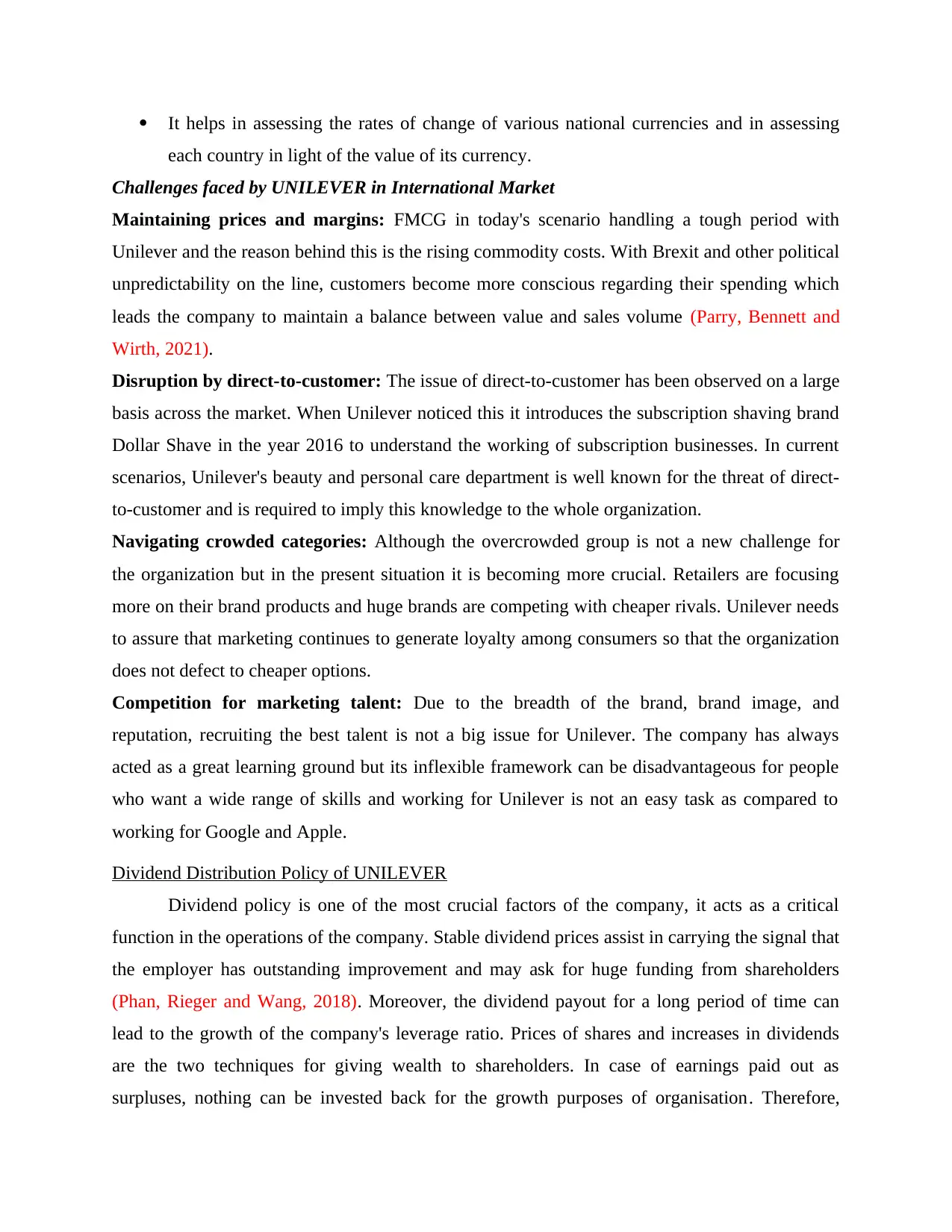
It helps in assessing the rates of change of various national currencies and in assessing
each country in light of the value of its currency.
Challenges faced by UNILEVER in International Market
Maintaining prices and margins: FMCG in today's scenario handling a tough period with
Unilever and the reason behind this is the rising commodity costs. With Brexit and other political
unpredictability on the line, customers become more conscious regarding their spending which
leads the company to maintain a balance between value and sales volume (Parry, Bennett and
Wirth, 2021).
Disruption by direct-to-customer: The issue of direct-to-customer has been observed on a large
basis across the market. When Unilever noticed this it introduces the subscription shaving brand
Dollar Shave in the year 2016 to understand the working of subscription businesses. In current
scenarios, Unilever's beauty and personal care department is well known for the threat of direct-
to-customer and is required to imply this knowledge to the whole organization.
Navigating crowded categories: Although the overcrowded group is not a new challenge for
the organization but in the present situation it is becoming more crucial. Retailers are focusing
more on their brand products and huge brands are competing with cheaper rivals. Unilever needs
to assure that marketing continues to generate loyalty among consumers so that the organization
does not defect to cheaper options.
Competition for marketing talent: Due to the breadth of the brand, brand image, and
reputation, recruiting the best talent is not a big issue for Unilever. The company has always
acted as a great learning ground but its inflexible framework can be disadvantageous for people
who want a wide range of skills and working for Unilever is not an easy task as compared to
working for Google and Apple.
Dividend Distribution Policy of UNILEVER
Dividend policy is one of the most crucial factors of the company, it acts as a critical
function in the operations of the company. Stable dividend prices assist in carrying the signal that
the employer has outstanding improvement and may ask for huge funding from shareholders
(Phan, Rieger and Wang, 2018). Moreover, the dividend payout for a long period of time can
lead to the growth of the company's leverage ratio. Prices of shares and increases in dividends
are the two techniques for giving wealth to shareholders. In case of earnings paid out as
surpluses, nothing can be invested back for the growth purposes of organisation. Therefore,
each country in light of the value of its currency.
Challenges faced by UNILEVER in International Market
Maintaining prices and margins: FMCG in today's scenario handling a tough period with
Unilever and the reason behind this is the rising commodity costs. With Brexit and other political
unpredictability on the line, customers become more conscious regarding their spending which
leads the company to maintain a balance between value and sales volume (Parry, Bennett and
Wirth, 2021).
Disruption by direct-to-customer: The issue of direct-to-customer has been observed on a large
basis across the market. When Unilever noticed this it introduces the subscription shaving brand
Dollar Shave in the year 2016 to understand the working of subscription businesses. In current
scenarios, Unilever's beauty and personal care department is well known for the threat of direct-
to-customer and is required to imply this knowledge to the whole organization.
Navigating crowded categories: Although the overcrowded group is not a new challenge for
the organization but in the present situation it is becoming more crucial. Retailers are focusing
more on their brand products and huge brands are competing with cheaper rivals. Unilever needs
to assure that marketing continues to generate loyalty among consumers so that the organization
does not defect to cheaper options.
Competition for marketing talent: Due to the breadth of the brand, brand image, and
reputation, recruiting the best talent is not a big issue for Unilever. The company has always
acted as a great learning ground but its inflexible framework can be disadvantageous for people
who want a wide range of skills and working for Unilever is not an easy task as compared to
working for Google and Apple.
Dividend Distribution Policy of UNILEVER
Dividend policy is one of the most crucial factors of the company, it acts as a critical
function in the operations of the company. Stable dividend prices assist in carrying the signal that
the employer has outstanding improvement and may ask for huge funding from shareholders
(Phan, Rieger and Wang, 2018). Moreover, the dividend payout for a long period of time can
lead to the growth of the company's leverage ratio. Prices of shares and increases in dividends
are the two techniques for giving wealth to shareholders. In case of earnings paid out as
surpluses, nothing can be invested back for the growth purposes of organisation. Therefore,
Paraphrase This Document
Need a fresh take? Get an instant paraphrase of this document with our AI Paraphraser
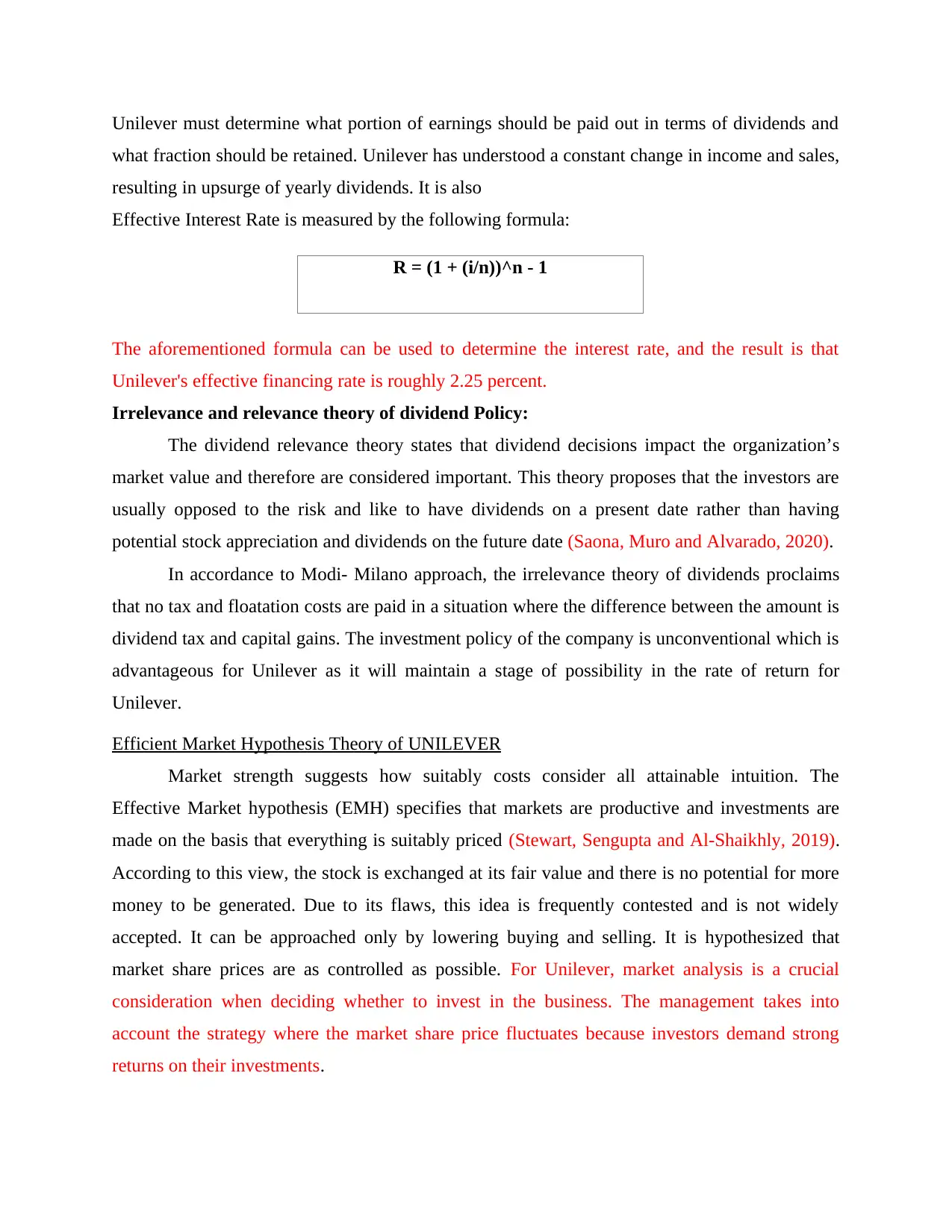
Unilever must determine what portion of earnings should be paid out in terms of dividends and
what fraction should be retained. Unilever has understood a constant change in income and sales,
resulting in upsurge of yearly dividends. It is also
Effective Interest Rate is measured by the following formula:
The aforementioned formula can be used to determine the interest rate, and the result is that
Unilever's effective financing rate is roughly 2.25 percent.
Irrelevance and relevance theory of dividend Policy:
The dividend relevance theory states that dividend decisions impact the organization’s
market value and therefore are considered important. This theory proposes that the investors are
usually opposed to the risk and like to have dividends on a present date rather than having
potential stock appreciation and dividends on the future date (Saona, Muro and Alvarado, 2020).
In accordance to Modi- Milano approach, the irrelevance theory of dividends proclaims
that no tax and floatation costs are paid in a situation where the difference between the amount is
dividend tax and capital gains. The investment policy of the company is unconventional which is
advantageous for Unilever as it will maintain a stage of possibility in the rate of return for
Unilever.
Efficient Market Hypothesis Theory of UNILEVER
Market strength suggests how suitably costs consider all attainable intuition. The
Effective Market hypothesis (EMH) specifies that markets are productive and investments are
made on the basis that everything is suitably priced (Stewart, Sengupta and Al-Shaikhly, 2019).
According to this view, the stock is exchanged at its fair value and there is no potential for more
money to be generated. Due to its flaws, this idea is frequently contested and is not widely
accepted. It can be approached only by lowering buying and selling. It is hypothesized that
market share prices are as controlled as possible. For Unilever, market analysis is a crucial
consideration when deciding whether to invest in the business. The management takes into
account the strategy where the market share price fluctuates because investors demand strong
returns on their investments.
R = (1 + (i/n))^n - 1
what fraction should be retained. Unilever has understood a constant change in income and sales,
resulting in upsurge of yearly dividends. It is also
Effective Interest Rate is measured by the following formula:
The aforementioned formula can be used to determine the interest rate, and the result is that
Unilever's effective financing rate is roughly 2.25 percent.
Irrelevance and relevance theory of dividend Policy:
The dividend relevance theory states that dividend decisions impact the organization’s
market value and therefore are considered important. This theory proposes that the investors are
usually opposed to the risk and like to have dividends on a present date rather than having
potential stock appreciation and dividends on the future date (Saona, Muro and Alvarado, 2020).
In accordance to Modi- Milano approach, the irrelevance theory of dividends proclaims
that no tax and floatation costs are paid in a situation where the difference between the amount is
dividend tax and capital gains. The investment policy of the company is unconventional which is
advantageous for Unilever as it will maintain a stage of possibility in the rate of return for
Unilever.
Efficient Market Hypothesis Theory of UNILEVER
Market strength suggests how suitably costs consider all attainable intuition. The
Effective Market hypothesis (EMH) specifies that markets are productive and investments are
made on the basis that everything is suitably priced (Stewart, Sengupta and Al-Shaikhly, 2019).
According to this view, the stock is exchanged at its fair value and there is no potential for more
money to be generated. Due to its flaws, this idea is frequently contested and is not widely
accepted. It can be approached only by lowering buying and selling. It is hypothesized that
market share prices are as controlled as possible. For Unilever, market analysis is a crucial
consideration when deciding whether to invest in the business. The management takes into
account the strategy where the market share price fluctuates because investors demand strong
returns on their investments.
R = (1 + (i/n))^n - 1
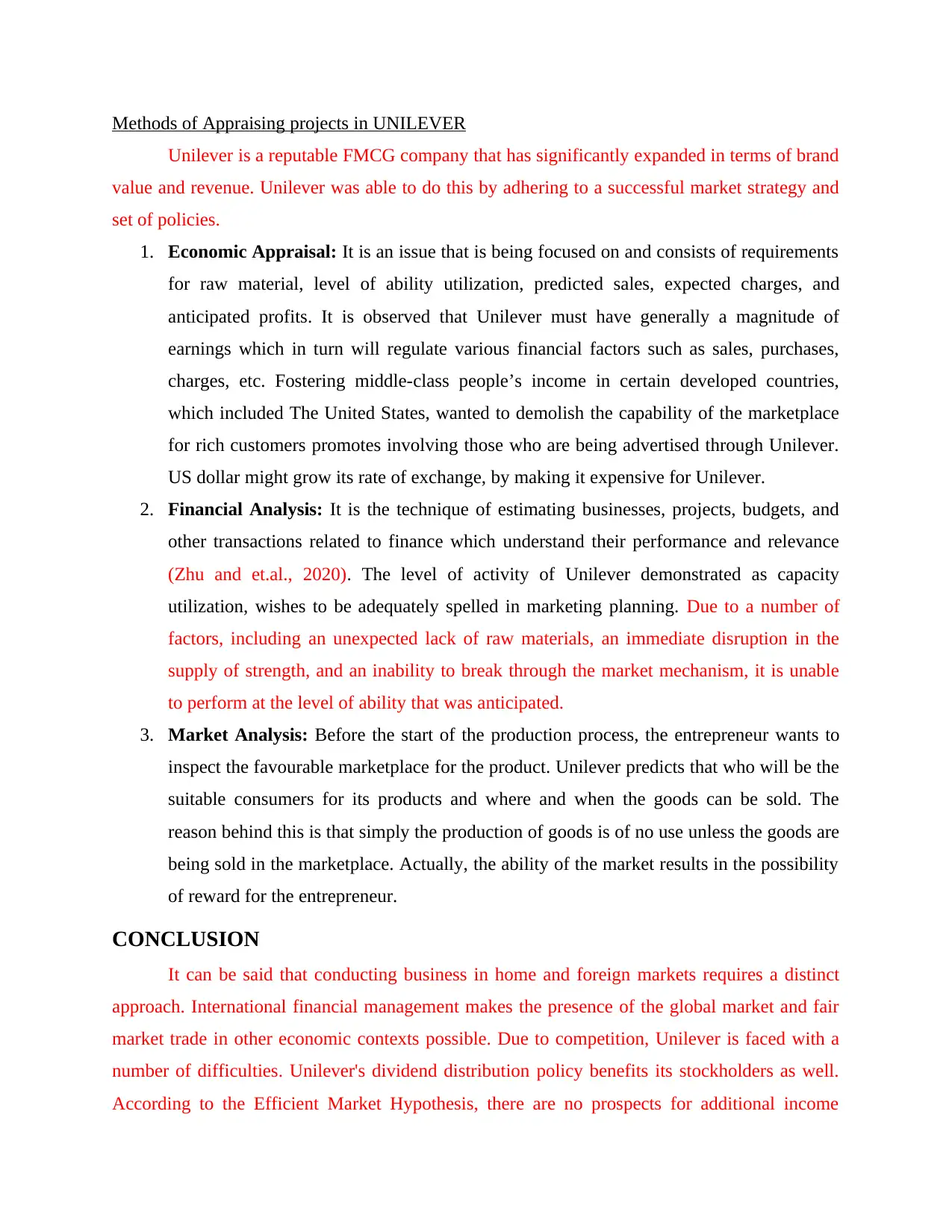
Methods of Appraising projects in UNILEVER
Unilever is a reputable FMCG company that has significantly expanded in terms of brand
value and revenue. Unilever was able to do this by adhering to a successful market strategy and
set of policies.
1. Economic Appraisal: It is an issue that is being focused on and consists of requirements
for raw material, level of ability utilization, predicted sales, expected charges, and
anticipated profits. It is observed that Unilever must have generally a magnitude of
earnings which in turn will regulate various financial factors such as sales, purchases,
charges, etc. Fostering middle-class people’s income in certain developed countries,
which included The United States, wanted to demolish the capability of the marketplace
for rich customers promotes involving those who are being advertised through Unilever.
US dollar might grow its rate of exchange, by making it expensive for Unilever.
2. Financial Analysis: It is the technique of estimating businesses, projects, budgets, and
other transactions related to finance which understand their performance and relevance
(Zhu and et.al., 2020). The level of activity of Unilever demonstrated as capacity
utilization, wishes to be adequately spelled in marketing planning. Due to a number of
factors, including an unexpected lack of raw materials, an immediate disruption in the
supply of strength, and an inability to break through the market mechanism, it is unable
to perform at the level of ability that was anticipated.
3. Market Analysis: Before the start of the production process, the entrepreneur wants to
inspect the favourable marketplace for the product. Unilever predicts that who will be the
suitable consumers for its products and where and when the goods can be sold. The
reason behind this is that simply the production of goods is of no use unless the goods are
being sold in the marketplace. Actually, the ability of the market results in the possibility
of reward for the entrepreneur.
CONCLUSION
It can be said that conducting business in home and foreign markets requires a distinct
approach. International financial management makes the presence of the global market and fair
market trade in other economic contexts possible. Due to competition, Unilever is faced with a
number of difficulties. Unilever's dividend distribution policy benefits its stockholders as well.
According to the Efficient Market Hypothesis, there are no prospects for additional income
Unilever is a reputable FMCG company that has significantly expanded in terms of brand
value and revenue. Unilever was able to do this by adhering to a successful market strategy and
set of policies.
1. Economic Appraisal: It is an issue that is being focused on and consists of requirements
for raw material, level of ability utilization, predicted sales, expected charges, and
anticipated profits. It is observed that Unilever must have generally a magnitude of
earnings which in turn will regulate various financial factors such as sales, purchases,
charges, etc. Fostering middle-class people’s income in certain developed countries,
which included The United States, wanted to demolish the capability of the marketplace
for rich customers promotes involving those who are being advertised through Unilever.
US dollar might grow its rate of exchange, by making it expensive for Unilever.
2. Financial Analysis: It is the technique of estimating businesses, projects, budgets, and
other transactions related to finance which understand their performance and relevance
(Zhu and et.al., 2020). The level of activity of Unilever demonstrated as capacity
utilization, wishes to be adequately spelled in marketing planning. Due to a number of
factors, including an unexpected lack of raw materials, an immediate disruption in the
supply of strength, and an inability to break through the market mechanism, it is unable
to perform at the level of ability that was anticipated.
3. Market Analysis: Before the start of the production process, the entrepreneur wants to
inspect the favourable marketplace for the product. Unilever predicts that who will be the
suitable consumers for its products and where and when the goods can be sold. The
reason behind this is that simply the production of goods is of no use unless the goods are
being sold in the marketplace. Actually, the ability of the market results in the possibility
of reward for the entrepreneur.
CONCLUSION
It can be said that conducting business in home and foreign markets requires a distinct
approach. International financial management makes the presence of the global market and fair
market trade in other economic contexts possible. Due to competition, Unilever is faced with a
number of difficulties. Unilever's dividend distribution policy benefits its stockholders as well.
According to the Efficient Market Hypothesis, there are no prospects for additional income
⊘ This is a preview!⊘
Do you want full access?
Subscribe today to unlock all pages.

Trusted by 1+ million students worldwide
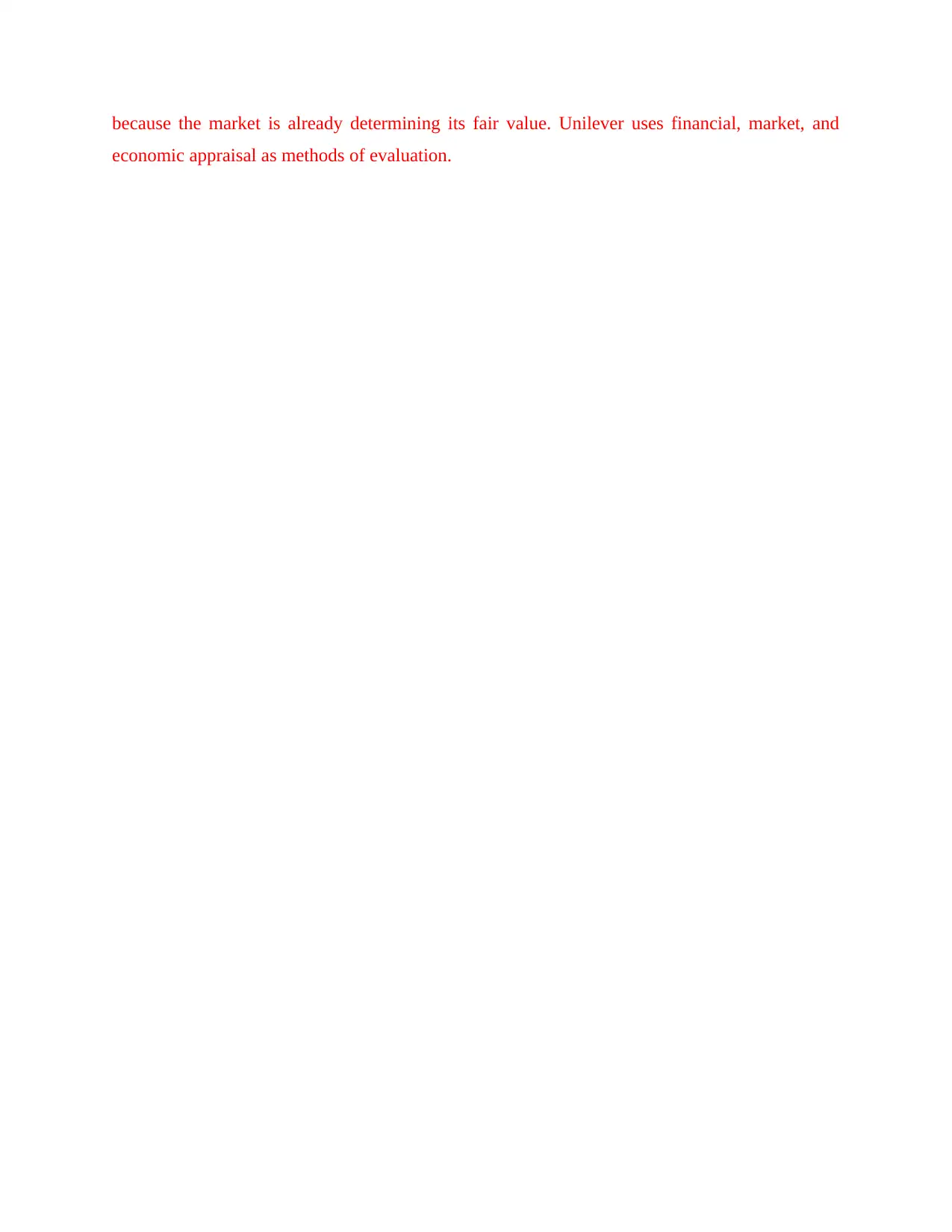
because the market is already determining its fair value. Unilever uses financial, market, and
economic appraisal as methods of evaluation.
economic appraisal as methods of evaluation.
Paraphrase This Document
Need a fresh take? Get an instant paraphrase of this document with our AI Paraphraser
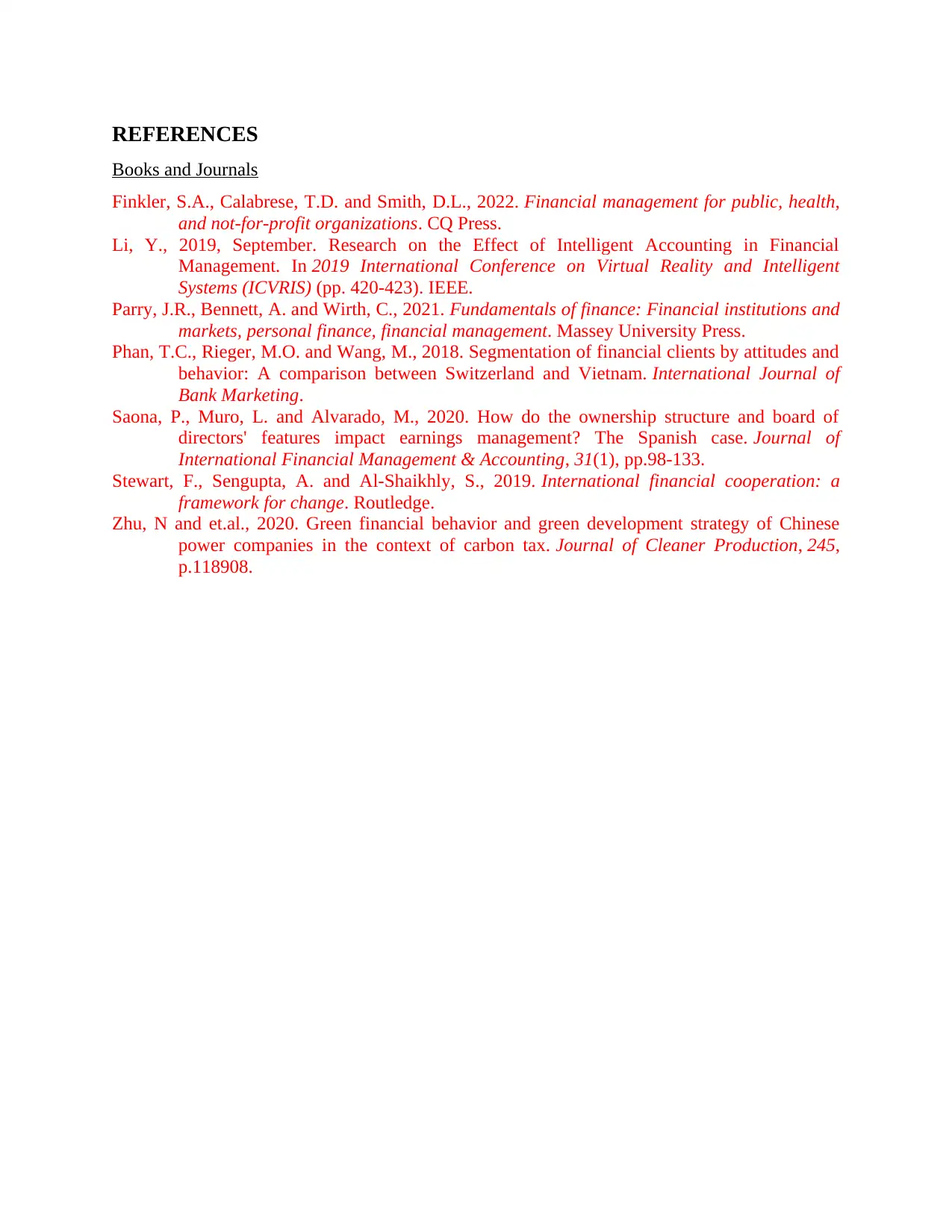
REFERENCES
Books and Journals
Finkler, S.A., Calabrese, T.D. and Smith, D.L., 2022. Financial management for public, health,
and not-for-profit organizations. CQ Press.
Li, Y., 2019, September. Research on the Effect of Intelligent Accounting in Financial
Management. In 2019 International Conference on Virtual Reality and Intelligent
Systems (ICVRIS) (pp. 420-423). IEEE.
Parry, J.R., Bennett, A. and Wirth, C., 2021. Fundamentals of finance: Financial institutions and
markets, personal finance, financial management. Massey University Press.
Phan, T.C., Rieger, M.O. and Wang, M., 2018. Segmentation of financial clients by attitudes and
behavior: A comparison between Switzerland and Vietnam. International Journal of
Bank Marketing.
Saona, P., Muro, L. and Alvarado, M., 2020. How do the ownership structure and board of
directors' features impact earnings management? The Spanish case. Journal of
International Financial Management & Accounting, 31(1), pp.98-133.
Stewart, F., Sengupta, A. and Al-Shaikhly, S., 2019. International financial cooperation: a
framework for change. Routledge.
Zhu, N and et.al., 2020. Green financial behavior and green development strategy of Chinese
power companies in the context of carbon tax. Journal of Cleaner Production, 245,
p.118908.
Books and Journals
Finkler, S.A., Calabrese, T.D. and Smith, D.L., 2022. Financial management for public, health,
and not-for-profit organizations. CQ Press.
Li, Y., 2019, September. Research on the Effect of Intelligent Accounting in Financial
Management. In 2019 International Conference on Virtual Reality and Intelligent
Systems (ICVRIS) (pp. 420-423). IEEE.
Parry, J.R., Bennett, A. and Wirth, C., 2021. Fundamentals of finance: Financial institutions and
markets, personal finance, financial management. Massey University Press.
Phan, T.C., Rieger, M.O. and Wang, M., 2018. Segmentation of financial clients by attitudes and
behavior: A comparison between Switzerland and Vietnam. International Journal of
Bank Marketing.
Saona, P., Muro, L. and Alvarado, M., 2020. How do the ownership structure and board of
directors' features impact earnings management? The Spanish case. Journal of
International Financial Management & Accounting, 31(1), pp.98-133.
Stewart, F., Sengupta, A. and Al-Shaikhly, S., 2019. International financial cooperation: a
framework for change. Routledge.
Zhu, N and et.al., 2020. Green financial behavior and green development strategy of Chinese
power companies in the context of carbon tax. Journal of Cleaner Production, 245,
p.118908.
1 out of 8
Related Documents
Your All-in-One AI-Powered Toolkit for Academic Success.
+13062052269
info@desklib.com
Available 24*7 on WhatsApp / Email
![[object Object]](/_next/static/media/star-bottom.7253800d.svg)
Unlock your academic potential
Copyright © 2020–2026 A2Z Services. All Rights Reserved. Developed and managed by ZUCOL.




